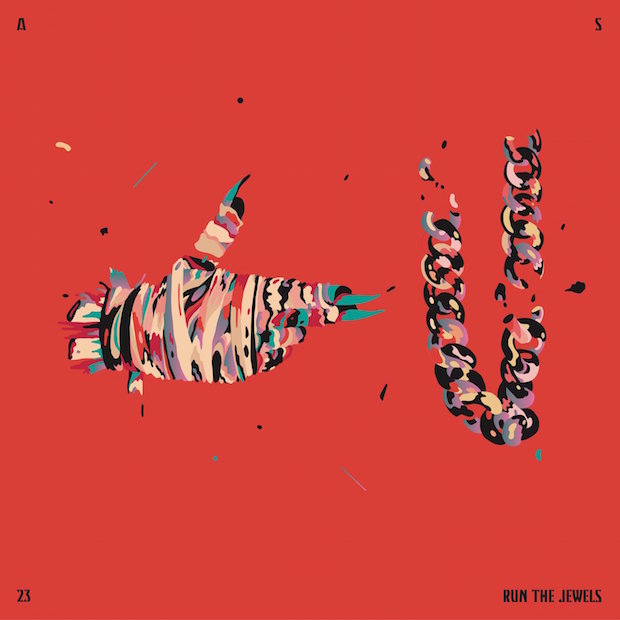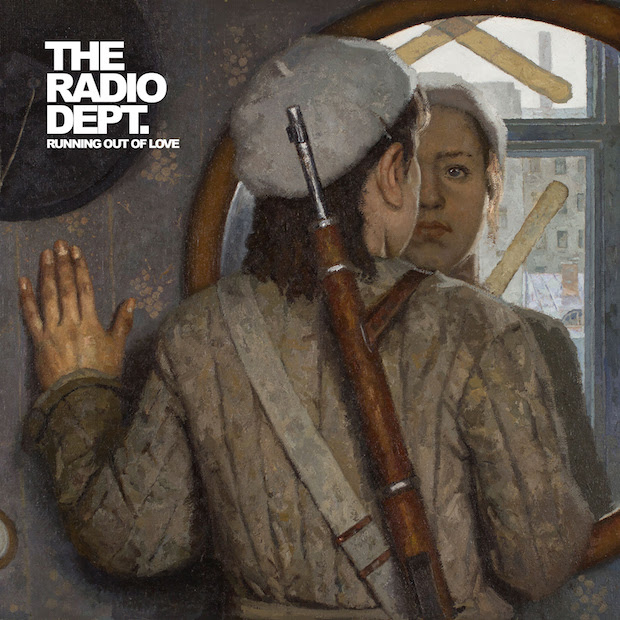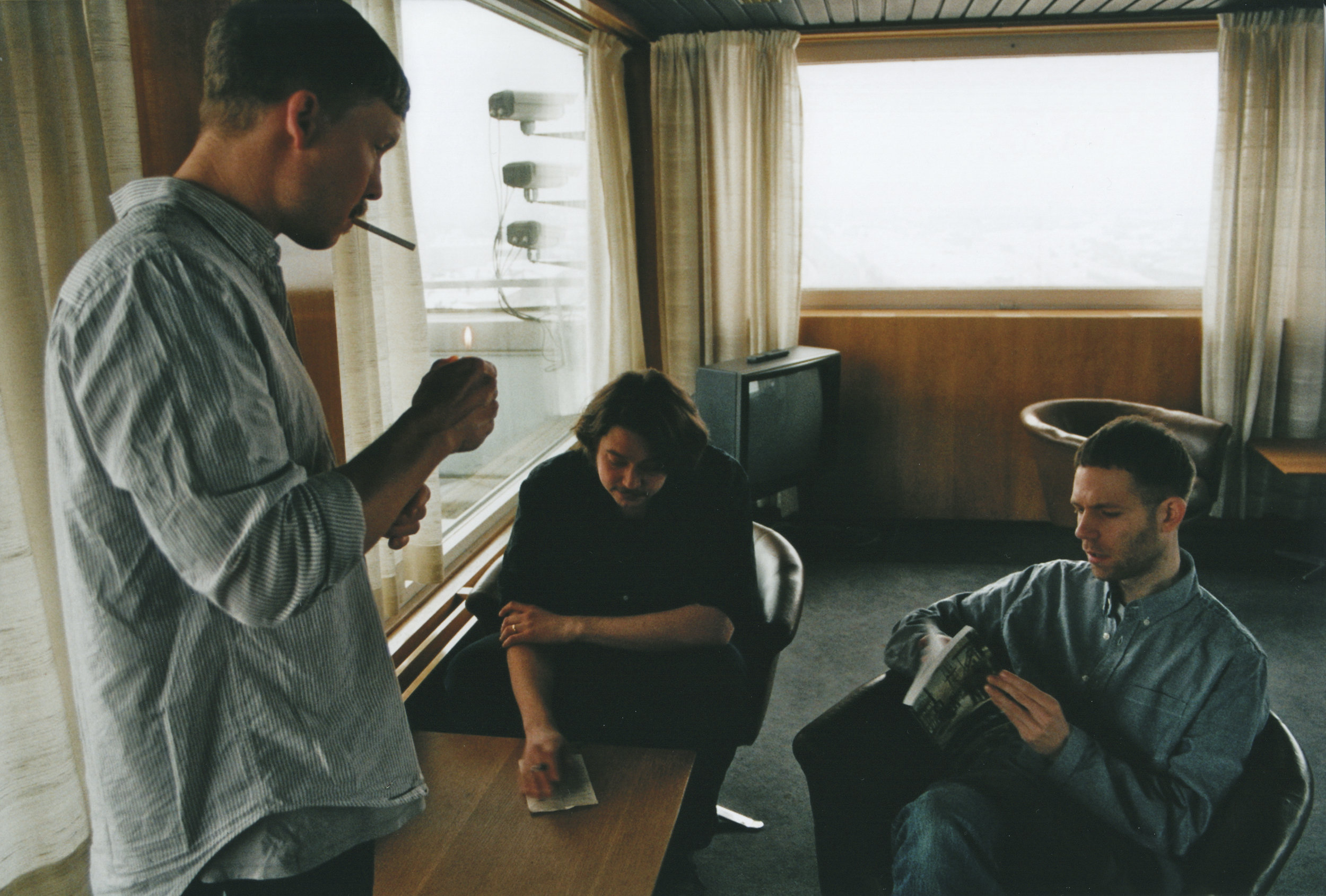FEATURE:

The Review Round-Up
_________________________
THERE are always those albums and singles that get overlooked...

or deserve a second look. There are a three distinct records - as part of a new thread - I feel deserve fresh ears and investigation. Either brand-new or an album/single that has caused some critical excitement in the last few weeks. In the first installment, I look at releases from Run the Jewels, The Radio Dept. and Julia Jacklin.
_____________________
SINGLE REVIEW: Run the Jewels - Talk to Me

The American hip-hop supergroup formed in New York in 2013 from the mind of rapper Killer Mike and rapper/producer El-P. Their eponymous debut album gained huge critical acclaim but it was the follow-up, Run the Jewels 2, that really put them on the map. That record showed Killer Mike and comrade El-P were worth of the hype and capable of topping a brilliant, original debut. Building the natural chemistry and simplicity of their opening salvo: that bond was solidified and found Killer Mike controlled and centered; giving room for El-P to maneuver and campaign. At the time, the album gained respect and praise but a few years down the line it is considered a pioneering hip-hop record and one of the finest (of its genre) of the time. Not only is the connection of the two stars rock-solid and combustible: the songs are uniformly splendid and nuanced.
That album laces traditional hip-hop put-downs with storytelling and personal insights. Run the Jewels spit rhymes at the rate of knots while the songwriting and lyrics are consistently spellbinding and peerless. You have to take a few days out to really enjoy the album and lets its multiple stories, diversion and ideas sink in. Not only the mark of a truly impressive musical force but two minds who knows what it takes to create the kind of music that remains in the mind – and will inspire generations to come.
Following the panicked and urgent Run the Jewels 2; the guys have been working with other artists and keeping themselves busy. They supported Jack White (at Madison Square Garden) back in 2015 and performed at events such as Bonnaroo Musical and Arts Festival. Not only that but they made a positive and huge impact to Nobody Speak – the lead single from DJ Shadow’s much-awaited album, The Mountain will Fall. It has been announced the third album from the hip-hop army will arrive before the end of the year. Talk to Me is the first single to be lifted from that album and coincides with the second anniversary of their Run the Jewels 2 record.

The song’s introduction is certainly edgy, compelling and adventurous. Squelchy electronics and jagged beats; rumbling protestations and street-level neon – all blended into something swaying and swaggered; break-neck yet restrained. Before a single word has been sung you are in the midst of another classic Run the Jewels introduction/song. Bad spray tans and toupees; wars with the Devil and gunplay – the words tumble out and you dive into a fast-flowing world of anger, violence and bizarre players.
Addressing terrorism, white-on-black racism and plane hijackings: subjects are close-to-the-bone but relevant. The guys rip the mask off fear and hesitation and let their words shoot into governments, corrupt politicians and the lesser species – those who perpetrate hatred and bigotry. You all gripped by the lyrics and stories but left dancing and head-nodding with a wave-crash combination of electronics and teasing beats. Despite a reliable attack of profanity and confidence, the song is never crude or petulant – another frantic, angry delivery and immense statement. In a time where Trump and political monsters threaten to exert influence and leadership – their music and brand of music are not only demanded but NEEDED. If Talk to Me is the typical sound of their third album: it will be another genius offering from one of the most pioneering acts in the world.
[youtube https://www.youtube.com/watch?v=1b9n0Amr9RI&w=560&h=315]
ALBUM REVIEW: The Radio Dept. - Running Out of Love

It has been some twenty-one years since Elin Almered and Johan Duncanson got The Radio Dept. started – named for a gas-station-turned-radio-repair-shop called Radioavdelningen. Following a three-year hiatus (until 1998), the duo reformed and brought Lisa Carlberg – girlfriend of new member Martin Larsson – and by 2001, Per Blomberg on drums and Daniel Tjäder on keyboards, the two-piece had swollen to an unwieldy band – skepticism as to whether there would be necessary intrigue and intensity with a five-piece. The band began modestly (in 2001) and gained positive reviews and were featured in Sweden through magazines and radio stations. Striking the ear of Labrador Records: the band was signed and their debut album, Lesser Maters, not only resonated because of its clever-clever title but the stunning music within. Many magazines (including NME) awarded it near-top marks and proclaimed it as one of the best albums of 2003. From there, the band had the momentum and critical praise – Per Blomgren and Lisa Carlberg departed the group around the time and were not on the L.P. The band opted to use digital drum tracks and decided to draft in a bass player.
The Radio Dept. progressed and blossomed into 2006 and, buoyed by the widespread recognition of 2003-singles Pulling Our Weight and Keen on Boys, took in new sounds and directions. Gone were the early-days distortion and in its place was synthesisers. Little touring and insufficient exposure meant Pet Grief didn’t get a huge reception and gained mixed reviews. A lot of sources were less-than-kind and noted how the lack of discipline, too many changes and reinvention did not favour the band – yearning for the beauty, consistency and quality. Inter-album E.P.s were released prior to Clinging to a Scheme (their third album in 2010) but perhaps with less critical nod and excitement than their debut album. This slightly deteriorated attention has not deterred the band who announced their fourth album earlier in the year.
The band connects with multiple genres – alternative-rock and shoegazing among them – and bring more innovation and structure to their current work. Rather than reclaim and retreat to their debut album sounds: the band have gone more into electronic/synth. territory on their fourth L.P. Almost dispensing entirely of rock and electronic guitars: what we have now is a slicker and more polished collection of songs. Some have noted how professional and rough-around-the-edges some of the songs appear – enough fizz, fuzz and kick to evoke images of rock and recklessness. Now a trio – the band wrote and discarded an album of guitar-based songs prior to Running Out of Love – they are back and entering a new phase in their careers.
[youtube https://www.youtube.com/watch?v=KAmhKuVg69c&w=560&h=315]
Sloboda Narodu is a confusing and hard-to-spell title (annoying when you’re reviewing) but redeems itself by being full of interesting, patterned beats and percussive clash. Blending tribal pitter-patter with rousing, sea-crash clash provides the introduction plenty of guile and fascination. The vocals do get a little weighed under the composition-production and can be hard to decipher – maybe, in small part, due to the accent and delivery. The opening track has plenty of interesting diversions but is not the rousing and all-encompassing lead-off song one would hope. Swedish Guns fares better in that respect with its syncopated electronic stutters and militaristic jump – quite intense and swaggering to start; growing and becoming bolder with time. It is a song that has elements of hip-hop and rap – the instrumental delivery – but retains its colour, youthfulness and spirited dance. Again, some of the vocals get lost but there is more emphasis on texture and sound – the vocals add extra instrumentation but are never too revealing or vital to matter (if they are lost).
Thieves of State is one of the most interesting passages from Running Out of Love and a title track, perhaps. One gets romantic, tender electronic keys – signifying something passionate and hopeful – but the racing (background) synths. portray someone fleeing and elusive – perhaps impatient and bereft. It is a brief instrumental that is a sort of mid-way point and a chance for reflection. The band blend modernism with diasporic dread; banging, rousing jungle codas alongside something elliptical and graceful without ever losing their heads and sense of direction. Occupied recalls their early work but adds new strands and threads on top – mingling clapping percussive beats with luminous, enticing backing synths. It is a long and ambitious song that seems to (in theory) unify their previous work into one moment – for the most part, it works. Sometimes beach-set and seduced; at others, it is spirited and ready for a good ol’ dance; it will appeal to those who like their electronic music spiked and lacking inhibitions and those who prefer something more intelligent, controlled and engaging. Can’t Be Guilty does not really add much to their album and is one of the forgettable cuts. The title track (the actual one) suffers a bit from being low down the pack (the penultimate number) and is another song that never fully grips the senses.
[youtube https://www.youtube.com/watch?v=CEPdvwjLpNw&w=560&h=315]
Running Out of Love is nowhere near the peak of the band’s debut but is stronger than their last couple of albums. It would be nice to hear the vocal higher up and some stiffer editing – take out one or two tracks – as it can feel bloated and exhaustive at times. Some of the songs sound too alike and rehash the band’s older work. What shines is plenty of promise and plenty to draw you in. Emphasis and attention should be paid to the compositional ambitions which say so much without a word being sung. More a story/concept than ten individual songs – it is one you will want to get involved with and stick with until the end.

Running Out of Love is available now via Labrador Records
ALBUM REVIEW: Julia Jacklin - Don't Let the Kids Win

Julia Jacklin considered a career in social work, as the story goes. Raised in the Blue Mountains to a teaching family: Jacklin’s exposure to music and revelation was, rather oddly, Britney Spears. In addition to being a peculiar Muse – and making many of us feel rather old – she realised Spears has achieved a lot by the age of twelve – an impressionable and ambitious youngster felt rather unaccomplished and procrastinating compared with a pre-teen Spears. That mixture of charming precociousness and instant foresight saw her take classical singing lessons. Learning voice control was a key lesson – one she brings to her music – but soon found Jacklin yearning to join a band – whereupon she would daub herself in surf clothes and rock along to Avril Lavigne covers. Luckily, Julia Jacklin has grown into a cooler and more original artist; not someone who you’ll find aping a Canadian punk wannabe.
Her unending and unerring passion to sing and perform has defined her music career: few contemporaries have that lionised, all-consuming passion to give themselves to music. Her changing music tastes – as she grew into her twenties, Fiona Apple was an inspiration – meant by the age of twenty-five (whilst residing in a garage and selling essential oils) she was mixing the headiness of Fiona Apple’s words; the spicy and cutting electric guitar of Anna Calvi; natural interpretation from Angel Olsen. Despite all the name-dropping and fellow musicians: Julia Jacklin’s debut album, Don’t Let the Kids Win, is as much about her travels, growth and backstory than anyone else’s. She is still discovering and living life; searching and probing: this curiosity, emotion and self-discovery emanates beautifully throughout the record.
Recorded at New Zealand’s legendary Sitting Room studios with Ben Edwards: Don’t Let the Kids Win unifies heart-aching alt-country with spirited indie-folk; all topped and augmented by Jacklin's distinctive, rich voice and keen wit. Critics have been seduced by her heartfelt music and star quality: the embers of Angel Olsen and Fleetwood Mac; a relatable set of lyrics performed by someone who transcends expectations and the ordinary. Latest single Leadlight – a video directed by Jacklin herself – has garnered positive reviews and gives the listener an impression of what the record is all about. Having quit her factory job to pursue music, and being excited about its imminent release, she will embark on a string of tour dates. Currently in California; she will hit Portland and Vancouver; over to Germany later in the month before reaching Brighton on November 3rd.
[youtube https://www.youtube.com/watch?v=Z-qvTPxUlxg&w=560&h=315]
Given all the colourful and unique road-to-now build-up; Don’t Let the Kids Win ensures it makes its impressions in the first track. Pool Party details pool-side substance abuse but is given plenty of humour and wit. A staple of the coolest and savviest stations around the U.K.: many will be familiar with the song’s swaying vocal and country-meets-indie composition. Although some of Jacklin’s words can come across slurred and lack decipherability; you are enticing and graced by a beautiful and refined voice and insightful, story-filled narrative. Although the heroine wants the love (of her drug-taking boy) her heart is heavy when he’s high; she gulps with nerves every time her man jumps into a pool. Rather than going along with the unwise lifestyle choice: she is looking from the sidelines and knows how reckless it is. Pathos and humour mix; clever wordplay and stark emotions. Leadlight best frames Jacklin’s voice and is one of the most committed, beautiful and soul-baring performances on the record. In terms of the composition; it is a softer, more restrained take on Pool Party’s waltzing drum-and-guitar combination. Once again, the voice does get a little distorted and suffers from intelligibility – the listener might need a lyric sheet at certain points. That said – and similar to the opening track – the mood, performance and delivery compensate for any short-fallings.
Wrestling with relationship qualms and the admonishment of a friend; Elizabeth deals with tough concerns. “So shaky” are the first words and the heroine promises loyalty – even if it “all falls through”. Whether that is directed at her friend or a misjudged lover; you are transported into the song and act as a spectator as the events unfold. Involving, bare-naked and fragile: a song that boasts incredible evocative and varied guitar playing; a definite album standout. More electric drive and energy is added into Motherland. It finds Jacklin working over calm-strummed blues strings and is one of the most pressing and determined performances across Don’t Let the Kids Win. L.A. Dreams documents the banality of a relationship breakdown in slow-motion: a song that asks why her man went to the grocery store on the day he planned to leave. Left with an abundance of food – she is unable to eat –there is a little humour that emerges from a sense of huge loss and confusion.
[youtube https://www.youtube.com/watch?v=fua9nrkUYew&w=560&h=315]
Although the album is quite top-heavy and the vocal clarity (unable to understand the lyrics on some songs) can be a concern: there are many positives to take from Julia Jacklin’s debut album. Conceiving it as a heartbreak album; she realised it was a retrospective investigation – someone hitting 24 and feeling nostalgic about youth. Not the planet-saving social worker she imagined: that singular decision to consecrate herself to music is under the spotlight. If Jacklin is funny and relaxed in person: her serious subject matter and frank emotions might seem at odds and disarming. The album is Jacklin freaking out a bit. With her peers settling down and knowing what they want in life: she is the confused artist reconciling with her new choices. Don’t Let the Kids Win confronts the issue of growing old but realises things will be okay – everyone feels the same. What one gets is a consistently revelatory and personal album run-through with heart-melting vocals and sonic richness. If Jacklin is unsure whether a life as a musician was a wise choice: Don’t Let the Kids Win should ease her mind and settle that debate.

Don't Let the Kids Win is available now through Transgressive Records.
